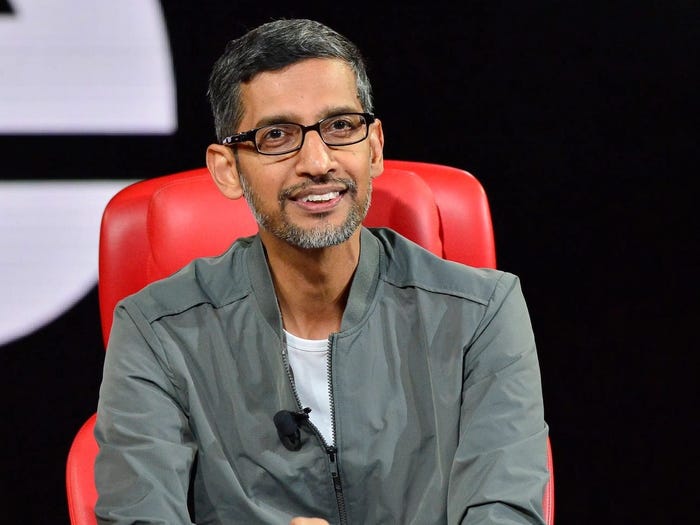Sundar Pichai is a prominent figure in the tech industry, serving as the CEO of Alphabet Inc. and its subsidiary Google. Born in India on June 10, 1972, Pichai has become known for his leadership and contributions to the development of the Android operating system.
Android, initially founded by Andy Rubin, Rich Miner, Nick Sears, and Chris White in 2003, caught the attention of Google due to its potential for creating smarter mobile devices. Recognizing the benefits of Android’s flexibility and upgradability, Google acquired the company in 2005 for a reported sum of at least $50 million.
Pichai played a significant role in Google’s efforts to promote and enhance the Android platform. Over the span of nine years, he served as a Google vice president, spearheading the creation and advancement of the Android operating system for various mobile devices.
Under Pichai’s leadership, Android experienced tremendous growth and innovation. The platform became widely adopted by handset manufacturers and mobile carriers, thanks to its user-friendly interface and ability to adapt to different hardware specifications.
Pichai’s vision for Android extended beyond smartphones, as he aimed to expand its reach to other devices, such as tablets, smart TVs, and wearables. This strategy helped solidify Android’s position as a leading operating system in the tech industry.
Beyond Android, Pichai’s influence within Google and Alphabet has been significant. As CEO, he has overseen various initiatives and advancements, including the development of Google’s artificial intelligence technologies, cloud computing services, and expansion into new markets.
Pichai’s leadership style is often praised for its focus on collaboration and innovation. He encourages employees to think outside the box and explore new ideas, fostering a culture of creativity within the company.
Sundar Pichai’s role as the CEO of Alphabet Inc. and Google has been instrumental in the growth and success of the Android operating system. His leadership and vision have propelled Android to become one of the most widely used and versatile platforms in the tech industry. With Pichai at the helm, it is clear that Android will continue to evolve and shape the future of mobile and connected devices.

Who is the CEO of Android?
The CEO of Android is Sundar Pichai. Sundar Pichai is an Indian-born American business executive who currently serves as the chief executive officer of Alphabet Inc. and its subsidiary, Google. He was born on June 10, 1972, and is widely recognized for his leadership and contributions to the technology industry. Sundar Pichai became the CEO of Google in August 2015 and played a crucial role in the development and expansion of the Android operating system. Under his leadership, Android has grown to become one of the most popular mobile operating systems globally, powering billions of devices worldwide. Sundar Pichai’s strategic vision and innovative thinking have significantly influenced the direction and success of Android as a platform.
Who is the Main Founder of Android?
The main founder of Android is Andy Rubin. He co-founded Android Inc. in October 2003 in Palo Alto, California, along with Rich Miner, Nick Sears, and Chris White. Andy Rubin envisioned the Android project to have immense potential in creating smarter mobile devices that could understand and adapt to users’ preferences and location.
Does Google Own Android?
Google owns Android. In 2005, Google acquired Android Inc., along with its key employees, for a sum of at least $50 million. This acquisition allowed Google to take control of the mobile platform and its development.
Before Google’s acquisition, Android Inc. was a small startup company focused on developing a mobile operating system. Google recognized the potential of Android and saw it as an opportunity to expand its reach into the mobile market.
After acquiring Android, Google marketed the platform to handset manufacturers and mobile carriers, highlighting its flexibility and upgradability as major benefits. This approach allowed Android to gain traction in the market and eventually become one of the leading mobile operating systems worldwide.
Google acquired Android Inc. in 2005 and has since owned and developed the Android mobile platform.
What Did Andy Rubin Invent?
Andy Rubin is a renowned computer scientist and entrepreneur who played a significant role in the development and promotion of the Android operating system. He founded Android Inc. in 2003, which later became a subsidiary of Google in 2005. Rubin served as a Google vice president for nine years, leading the company’s efforts in creating and advancing the Android platform for mobile devices and other technologies.
Here are some key points about Andy Rubin’s contributions:
1. Android Inc.: In 2003, Rubin established Android Inc., a company focused on developing an operating system for digital cameras. However, the company’s direction shifted towards creating a mobile operating system.
2. Acquisition by Google: In 2005, Google acquired Android Inc., and Rubin joined Google as a vice president. This acquisition provided Google with a strong foundation to compete in the mobile market.
3. Android Operating System: Under Rubin’s leadership, Google developed and promoted the Android operating system. Android quickly gained popularity and emerged as a major competitor to Apple’s iOS.
4. Open Source Nature: Rubin played a crucial role in making Android an open-source platform. This allowed developers to freely modify and customize the operating system, leading to a vast ecosystem of apps and devices.
5. Expansion of Android: Rubin’s efforts contributed to the expansion of Android beyond smartphones to include tablets, smartwatches, smart TVs, and other connected devices. Android became the most widely used mobile operating system worldwide.
6. Industry Collaboration: Rubin fostered partnerships with various hardware manufacturers and carriers to ensure the widespread adoption of Android. This collaboration helped establish Android as a dominant force in the mobile industry.
7. Essential Phone: After leaving Google in 2014, Rubin founded Essential Products, Inc., a company focused on creating innovative consumer electronics. The company’s first product was the Essential Phone, which aimed to provide a premium Android experience.
Andy Rubin’s contributions in inventing and promoting the Android operating system revolutionized the mobile industry, empowering millions of users and creating opportunities for developers worldwide.
Conclusion
Sundar Pichai is an Indian-born American business executive who currently serves as the chief executive officer (CEO) of Alphabet Inc. and its subsidiary Google. He has played a significant role in the development and success of Google’s Android operating system.
Google acquired Android Inc. in 2005, and under Pichai’s leadership, the Android platform has become one of the most popular and widely used mobile operating systems in the world. Pichai’s vision and strategic decisions have helped Android evolve into a flexible and upgradable platform, offering users a wide range of features and customization options.
As CEO of Google, Pichai has overseen various initiatives and projects, including the integration of artificial intelligence (AI) and machine learning into Google’s products and services. He has also focused on expanding Google’s presence in emerging markets and driving innovation in areas such as cloud computing, online advertising, and hardware.
Pichai’s leadership and expertise have earned him recognition and respect in the tech industry. His ability to adapt to changing market dynamics and drive Google’s growth has positioned him as one of the most influential CEOs in the technology sector.
Sundar Pichai’s contributions as the CEO of Google and his instrumental role in the development of Android have solidified his position as a prominent figure in the world of technology. His vision, strategic acumen, and commitment to innovation continue to shape the future of Google and its products.













